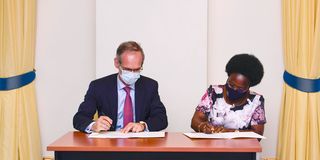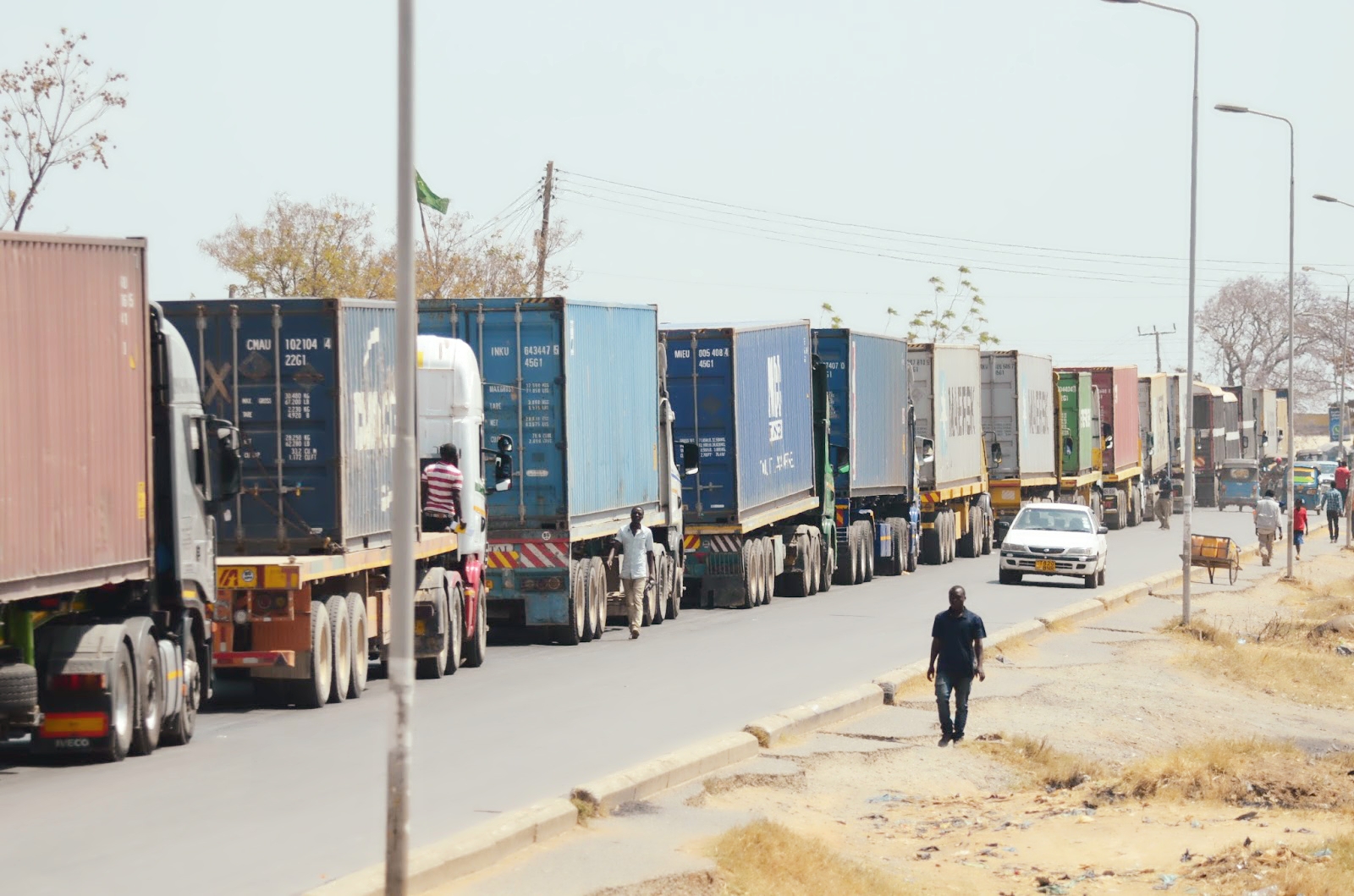Major breakthrough attained in $3.5bn Tanzania-Uganda pipeline

Uganda’s Energy and Mineral Development minister Mary-Gorett Kitutu signs on behalf of the government and Nicolas Terraz, Total’s Exploration and Production President for Africa, inks the agreement on behalf of his employer at State House in Entebbe. Photo | Courtesy
What you need to know:
- This follows Friday’s confirmed agreement between Total and the Ugandan government over differences which forced the project to stall since 2018
Dar es Salaam. All is set now for the kickoff of the Tanga-Hoima Pipeline, with Tanzania looking to March 2021 for the start of the construction of the $3.5 billion project.
This followed Friday’s confirmed agreement between French oil company Total and the Ugandan government over differences which forced the project to stall since 2018.
An initial plan for Tanzania and Uganda to have first oil flow in 2020 through the Uganda-Tanzania Crude Oil Pipe Line (UTCOP) was delayed after investors dragged their feet in making final investment decisions.
Total is now seeking to conclude a similar host government agreement with Tanzania, whose territory the pipe will traverse, to complete the tendering process for all engineering, procurement and construction contracts, according to the statement.
The country coordinator for the East African Crude Oil Pipe Line (Eacop) in Tanzania, Mr Salum Mnuna, told The Citizen that Tanzania is going on with similar negotiations that have been concluded between Total and Uganda.
“Basically, we have planned that by December, this year, we’ll have the final investment decision (FID) done. So, we will have discussions with Total soon and the completion of the agreement will depend on how the negotiations will be,” said Mr Mnuna.
He said experts were preparing for the talks but the expected start of the project would be March, 2021.
The FID, pegged at $3.5 billion is expected to bring to life a 1445-kilometre-long oil pipeline threading through Albertine to Tanga in Tanzania that will not only be the world’s longest heated crude oil pipeline but will also be the biggest joint East African investment in the bloc’s history.
Reports say that following the signing of the Host Government Agreement, Uganda’s President Yoweri Museveni has committed to nudge President John Magufuli to ‘resolve other pending issues.’
Total, for its part, has committed to restart the acquisition of land on which the pipeline will pass, reports from Uganda said yesterday.
Uganda’s state newspaper New Vision quoted a statement on the talks, saying that Uganda has reached a deal with Total that will guide the participation of the national oil company in the crude (oil) export pipeline. The Uganda National Oil Company (UNOC) will hold a 15-per cent stake in the project.
According to an international business news website Bloomberg, the breakthrough regarding the pipeline was agreed at a meeting between Ugandan President Museveni and Patrick Pouyanné, the Total chairman and chief executive officer. It will pave way for the investment decision in the “coming months,” the firm said Friday by email from the Ugandan capital, Kampala.
Total is leading plans to build the conduit from Uganda’s oil fields in the west of the country to the Tanzanian port of Tanga along with partner Cnooc Ltd. of China and the two governments.
Uganda and Total also reached an agreement on modalities for the Uganda National Oil Co. participating in the pipeline project, the company said without providing details.
“We have today reached major milestones which pave the way to the final investment decision in the coming months,” the firm said in a statement released yesterday.
Uganda, which discovered commercially viable crude deposits in 2006, has an estimated 6-billion barrels of oil resources and plans to start pumping crude from the ground in 2023-24, according to government.
Uganda is banking on Total E&P and CNOOC, which are the two companies in the joint venture for the country’s oil resources, to arrive at a Final Investment Decision, to start the drilling, refining and selling of the country’s oil resources
The announcement is expected to unlock up to $10 billion of investment in Uganda to get the crude oil deposits out of the ground and onto the world market. Apart from the investments in the oil wells in western Uganda, the flagship project is expected to be a crude oil export pipeline to the Indian Ocean through Tanzania.
In April Total announced that it would acquire Tullow Oil’s assets in Uganda for $575 million. While this was lower than earlier valuations, the move, which China’s CNOOC chose not to pre-empt, gave Total a controlling stake in the oil project and allowed it to move forward faster.
Tullow, which previously owned a majority stake after buying out Heritage Oil, has run into financial headwinds and was seen as unable to raise finances quickly enough for its stake in developing the oil fields.
In June, this year negotiations for a Host Government Agreement (HGA) for project were reported to be on course.
This followed the completion of Total Oil’s acquisition of 33.334 percent of Tullow Oil’s stake thus paving the way for the French oil giant to own a 66.7 percent of upstream stake in the project. This gave it legal ownership and the right to fast-track execution of the project.
The HGA is an agreement between a foreign investor and the local government which is intended to reduce financial and political risks posed to investors by sudden changes in national laws.



